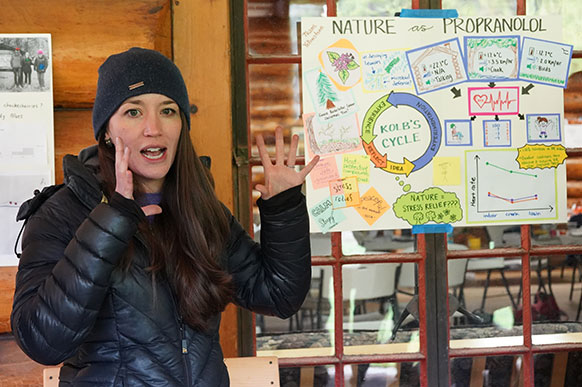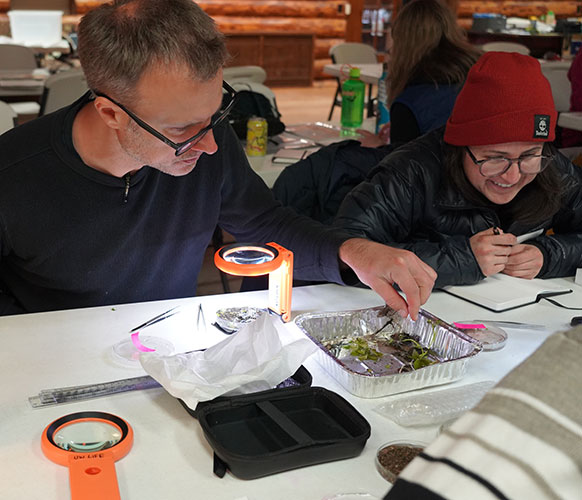STEM Faculty Participate in UW ‘LAMP Camp’ to Revolutionize Classroom Instruction
Published June 11, 2025

Sarah Pence, University of Wyoming School of Pharmacy assistant lecturer, shares her team’s experiential learning poster during the recent UW LAMP (Learning Actively Mentoring Program) Science Initiative Summer Institute at the historic Ranch A near Beulah. (Christi Boggs Photo)
Twenty-five college educators rolled up their sleeves and stepped into streams during the week of May 19-23, transforming from accomplished academics into enthusiastic students as part of an innovative program designed to revolutionize STEM (science, technology, engineering and mathematics) education.
The University of Wyoming's LAMP Science Initiative Summer Institute brought together 24 UW educators and one Northwest College faculty member at the historic Ranch A near Beulah. All participants are recipients of the 2025-26 LAMP (Learning Actively Mentoring Program) Fellowship, designed to help instructors master active-learning strategies.
The program's opening session immersed the seasoned academics in hands-on learning. Working individually and in teams, they explored the Ranch A ecosystem, from microscopic aquatic life to large-scale geological formations, then reflected on their discoveries and conducted their own experiments.
“It was so amazing to watch these educators, many of whom are top-notch researchers in their own field, dive into this activity with such excitement,” says Christi Boggs, associate director of online and digital learning at UW. “They were wading in the river, examining the undergrowth, doing jumping jacks and asking questions about insects, plants and even asparagus.”
LAMP Director Rachel Watson adds that this approach of experiential learning “asks us to consider that the most impactful learning can take place outside of the classroom, without the professor as the sole source of learning, and with learners who move outside of their academic silos.”
From Heart Rates to Parasitic Mites
Each of the interdisciplinary teams created a unique product from its experiential learning. Some conducted heart-rate tests to measure environmental impacts on cognitive and physical recovery, while others investigated factors affecting chokecherry trees’ susceptibility to parasitic mites. The process required skills ranging from teamwork and field measurement to coding in RStudio, a programming language for statistical computing and graphics.
Beyond outdoor experimentation, educators participated in team-based learning sessions led by Martha Inouye, an associate research scientist in UW’s Science and Math Teaching Center, to explore weather station data and scientific uncertainty. Alex Ziegler, an assistant curator from the UW Art Museum, guided object-based learning activities focused on deep observation skills.
Daily metacognitive reflection was integral to the experience, from quick one-minute papers to detailed nature journaling. Janel Seeley, director of UW’s Ellbogen Center for Teaching and Learning, led collaborative communication sessions, teaching participants to listen without preparing rebuttals and ask “truly open-ended questions,” Watson says.
Ed Nuhfer, a consultant and retired geologist, led synthetic sessions connecting online curriculum with institute learning, covering fractal neural network development and affective learning domains.

LAMP Science Initiative Summer Institute participants Ron Pepino, a UW physics and astronomy assistant lecturer, and Cinthia Campos-Hernandez, an anthropology postdoctoral research associate, observe microscopic life found in Sand Creek. The program is designed to help instructors master active-learning strategies. (Christi Boggs Photo)
Faculty Become Students
The role-reversal session proved transformative for participants, Watson says.
Sarah Pence, UW School of Pharmacy assistant lecturer, gives the program “five out of five stars,” noting she had previously avoided group work in her classes because of negative student experiences.
“LAMP camp taught me how to create the environment and guide team activities that left me, as the student, feeling supported, connected and learning so much that my brain hurt -- in a happy way,” Pence says.
Frankie Genoese, a UW kinesiology and health assistant professor, finds the experience equally valuable.
“The experiential learning activities allowed me to think creatively, collaborate with peers across disciplines and apply a range of new and familiar skills in a fun and supportive environment,” Genoese adds.
Evan O'Toole, a UW Department of Civil and Architectural Engineering and Construction Management assistant lecturer, praises the program’s mentors.
“Their enthusiasm for helping students learn -- not simply consume -- material was infectious,” O’Toole says. “We are privileged to have this opportunity at the University of Wyoming.”
Curriculum Development
During the institute’s final days, each LAMP Fellow developed personalized instructional strategies -- a process that began in April. Their informal presentations highlighted curriculum featuring student learning outcomes, assessment strategies and aligned active-learning methods. LAMP will support the instructors through 2026 as they implement and assess their strategies in STEM courses.
The program demonstrates UW’s commitment to transforming STEM education through active learning, Watson says. A smaller group of LAMP Fellows, including faculty members from three community colleges, will complete an online e-LAMP Summer Institute in late June, extending the program’s reach and impact across the region.
The institute successfully combined hands-on learning, collaborative team science and reflective practice to equip STEM educators with innovative teaching strategies that move beyond traditional lecture-based approaches, preparing them to create more engaging and effective learning environments for their students, Watson adds.
Lamp Camp participants were:
Bolaji Akorede, curriculum and instruction (science education).
Jennifer Bell, Department of Ecosystem Science and Management.
Casey Black, Department of Anthropology.
Melissa Bukovsky, Haub School of Environment and Natural Resources.
Cinthia Campos-Hernandez, Department of Anthropology.
Austin Conklin, STEM/Northwest College.
Spencer Cruz, Department of Zoology and Physiology/Program in Ecology and Evolution.
Francesca (Frankie) Genoese, Division of Kinesiology and Health.
Jian Gong, School of Computing.
Ian Hammontree, Department of Chemical and Biomedical Engineering.
Jason (Jake) Hawes, School of Computing and Haub School.
Paddington Hodza, Wyoming Geographic Information Science Center (WyGISC).
Hasan Iqbal, Department of Electrical Engineering and Computer Science.
Shanshan Li, School of Computing/WyGISC.
Utkarsh Kapoor, Department of Chemical and Biomedical Engineering.
Erin Klauk, Science Initiative/Department of Geology and Geophysics.
Rosa Virginia Melinda, Department of Chemistry.
Leena Myran, School of Pharmacy.
Evan O’Toole, Department of Civil and Architectural Engineering and Construction Management.
Sarah Pence, School of Pharmacy.
Zach Pence, Department of Mathematics and Statistics.
Ron Pepino, Department of Physics and Astronomy.
Hannah Phalen, Department of Psychology.
Mariela Srednik, Department of Veterinary Sciences.
Takashi (Tak) Suyama, Department of Chemistry.

